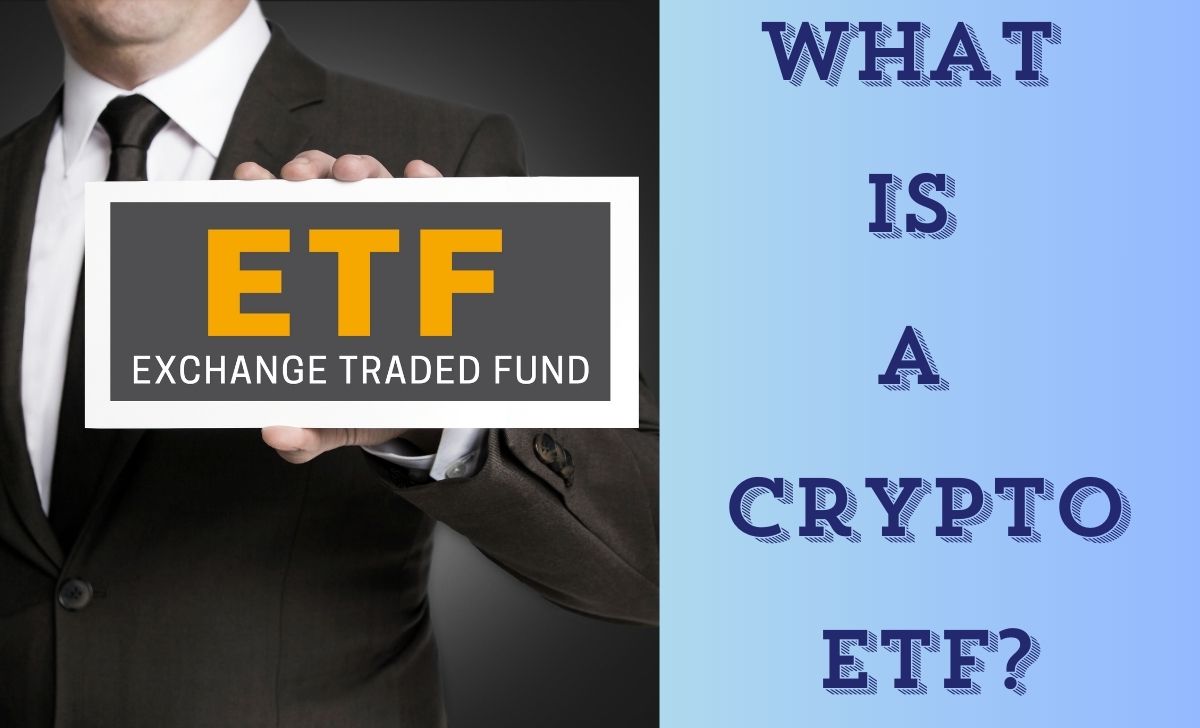Crypto ETF is an emerging investment product that has attracted the attention of many investors around the world. This is an attractive approach to participate in the cryptocurrency market, but at the same time, it also contains many risks that need to be noted.
This article of AZCoin will provide you with the necessary information about Crypto ETF, helping you better understand the operating mechanism and things to note before investing.
What is a Crypto ETF?

A Crypto ETF (short for Cryptocurrency Exchange-Traded Fund) is a type of investment fund listed on a stock exchange that allows investors to gain indirect exposure to the cryptocurrency market.
Instead of buying Bitcoin, Ethereum or other cryptocurrencies directly, investors can buy Crypto ETF certificates, which represent a portion of the value of a professionally managed cryptocurrency portfolio.
History of Crypto ETF

- 2013: Cameron and Tyler Winklevoss filed the first Bitcoin ETF in July.
- 2017: The Winklevoss brothers’ application was officially rejected by the US Securities and Exchange Commission (SEC) after four years.
- 2018 – 2020: Firms such as SolidX, Grayscale, Direxion and GraniteShares continued to file ETF applications but were either rejected or withdrew their applications.
- August 2021: SEC Chairman Gary Gensler said that he would allow Bitcoin futures ETFs to be traded if they complied with SEC rules for funds.
- October 16, 2021: The SEC approved the ProShares Bitcoin Strategy ETF, the first Bitcoin Futures ETF, to trade on the market.
- October 19, 2021: ProShares Bitcoin Strategy ETF (BITO) was officially listed on the US stock exchange.
- 2021: Other Bitcoin Futures ETFs approved include the Valkyrie Bitcoin Strategy ETF, the VanEck Bitcoin Strategy ETF and the AdvisorShares Managed Bitcoin Strategy ETF (CRYP).
- 2022: Additional Bitcoin Futures ETFs appear, including the VanEck Bitcoin Strategy ETF (XBTF), the Valkyrie Bitcoin Strategy ETF (BTF), the Simplify Bitcoin Strategy PLUS Income ETF (MAXI) and the Global X Blockchain and Bitcoin Strategy ETF (BITS).
- September 2023: The SEC approves Ethereum ETF as the underlying asset for the issuance of Futures ETFs. However, investor interest remains limited, with the first day trading volume reaching approximately $2 million.
BlackRock is currently the largest crypto etf fund in the world, you can learn more about: BlackRock
How Crypto ETFs Work

Crypto ETFs work on the same principle as traditional investment funds, with cryptocurrencies as the underlying assets. Fund managers select cryptocurrencies that they believe have potential and create a portfolio that fits their strategy, sometimes incorporating assets like nft blockchain projects to diversify their holdings.
Real-world example
For example, a Crypto ETF that tracks Bitcoin could be listed on a stock exchange under the ticker symbol BTCX. When you buy BTCX shares, you are investing in a portion of the value of Bitcoin through the ETF. If the price of Bitcoin increases, the price of BTCX shares will also increase accordingly, allowing you to benefit from the growth of the cryptocurrency market without having to worry about storing or securing your coins.
Pros and cons of Crypto ETF

Below are some of the pros and cons of Crypto ETF:
Pros
- Easy access: Investors can access the cryptocurrency market without having to manage a digital wallet or understand blockchain technology in depth.
- Diversification: Crypto ETFs help investors diversify their portfolios by owning multiple cryptocurrencies in a single fund.
- High liquidity: Crypto ETFs are traded on stock exchanges, providing higher liquidity than buying and selling cryptocurrencies directly.
- Safety: Investing in Crypto ETFs reduces the risk of hacking or loss because investors do not need to manage personal digital wallets.
Cons
While Crypto ETFs offer many attractive investment opportunities, there are also notable risks and drawbacks, such as:
- High management fees: Crypto ETFs typically have higher management fees than buying crypto directly due to the costs involved in managing and operating the fund.
- Trading restrictions: You cannot trade crypto directly and can only track its value.
- No direct holding of assets: Investors do not actually own the crypto, but only shares of the ETF, which can be a drawback for those who want to hold crypto directly.
- Tight regulation: Crypto ETFs are subject to government regulations, which can affect your privacy and flexibility.
Popular Crypto ETF classifications
There are many different types of Crypto ETFs on the market today, each catering to specific investment strategies. Below are some of the main types:
- Spot ETFs: Invest directly in cryptocurrencies and store them. This means that when you buy a Spot ETF, you actually own a portion of the cryptocurrencies that the ETF tracks.
- Futures-based ETFs: Invest in futures contracts of cryptocurrencies instead of owning the tokens directly. This approach provides exposure to the price movements of cryptocurrencies without needing to hold coins directly.
- Inverse (Short-selling) ETFs: Designed to profit from falling prices of cryptocurrencies.
- Leveraged ETFs: Use leverage to increase potential profits from price movements of cryptocurrencies.
- Blockchain ETFs: Invest in companies that develop and use blockchain technology, without necessarily owning the cryptocurrencies.
Why are Crypto ETFs Important to the crypto market?

Crypto ETFs play an important role in promoting the development of the cryptocurrency market, specifically:
- Attracting large investment capital: Crypto ETFs attract large investors, including investment funds and institutional investors, due to their convenience and high security. This helps increase the amount of capital flowing into the cryptocurrency market, promoting the development and stability of the market.
- Expanding the investor base: Crypto ETFs help expand the investor base by allowing people without deep knowledge of blockchain technology or cryptocurrencies to invest easily. This promotes diversification and growth of the market.
- Increasing liquidity: Crypto ETFs are traded on major stock exchanges, helping to increase liquidity for cryptocurrencies. High liquidity reduces price volatility and helps the market operate more stably.
- Supporting market value: Acceptance and investment from ETFs can help support the value of cryptocurrencies by creating stable and long-term demand. This could reduce price volatility and create a solid foundation for long-term market growth.
- Creating opportunities for derivative financial products: Crypto ETFs pave the way for the development of other derivative financial products such as futures and options. These products provide additional tools for investors to manage risks and optimize profits.
- Promoting innovation: Competition among Crypto ETF issuers drives innovation, creating new investment products tailored to investors’ evolving needs. Companies, including those featured on AZcoin – best crypto exchange 2024, are motivated to develop cutting-edge solutions to capture investor interest.
Conclusion
Above is information about Crypto ETF and things to know before investing. Hopefully the article helps you better understand this field. To ensure safety, always pay attention to the privacy policy.

I’m Jessi Lee, currently living in Singapore. I am currently working as a trader for AZCoin company, with 5 years of experience in the cryptocurrency market, I hope to bring you useful information and knowledge about virtual currency investment.
Email: [email protected]











